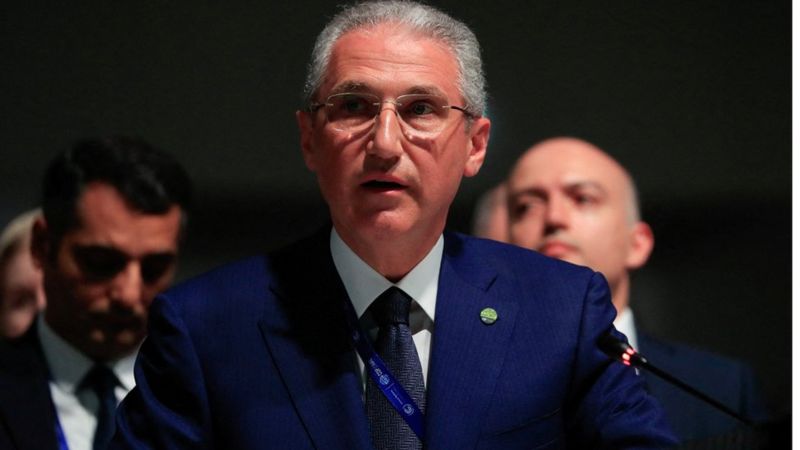COP29 President, Azerbaijan’s Babayev, says climate change still a global concern

By Faridat Salifu
Azerbaijan’s ecology minister and chair of the COP29 summit, Mukhtar Babayev, has stated that the conference has positioned the country as a global crossroads, and a bridge between the wealthy North and the poor South, the East and West, and oil producers and consumers.
Azerbaijan is hosting the 29th UN climate conference (COP29) at the Olympic Stadium.
Azerbaijan, home to the world’s first oil wells in the 1840s, remains heavily dependent on fossil fuels as oil and gas account for 90% of its exports and 60% of the government’s budget.
According to the International Energy Agency, this dependency has brought economic prosperity, significantly raising living standards of the country since the late 1990s.
But Azerbaijan is making efforts towards renewable energy, as it plans substantial expansions in wind and solar power, s proposed interconnector, which aims to deliver low-carbon electricity to Eastern Europe, stretching under the Black Sea to Bulgaria, Hungary, and Romania.
“We understand our responsibility,” Babayev said. “We can do more, and together with other countries, especially fossil fuel producers, we can lead this process,” the minister said.
The COP28 summit in Dubai saw countries agree to “transition away” from fossil fuels—a commitment that fell short for many advocates pushing for a complete phase-out. Nonetheless, it marked the first time the climate crisis’s root cause, fossil fuels, was directly addressed.
At COP29, attention will shift from fossil fuels to the critical need for finance to cut greenhouse gas emissions, fortify infrastructure against extreme weather, and achieve the “green transition” necessary to limit global warming to 1.5°C. Economists Lord Stern and Vera Songwe estimate that developing countries, excluding China, will need $2.4 trillion annually by 2030.
“We need to make finance available, accessible, and affordable. Developed world donors must heed the needs of developing countries,” Babayev emphasized.
The primary goal of COP29 is to establish a “new collective quantified goal” for climate finance. Mohamed Adow, director of the Power Shift Africa think tank, underscores the importance of a long-term finance goal to unlock the global energy transition and reduce emissions.
Countries like Zambia, facing severe hunger from its driest agricultural season in over 40 years, desperately need financial support. Environment Minister Collins Nzovu highlighted Africa’s negligible CO2 emissions compared to the severe climate impacts it endures. Yet, securing finance is challenging due to high interest rates and stringent conditions imposed by lenders who perceive poor countries as high-risk.
Similarly, the Maldives, threatened by rising sea levels and storm surges, struggles to attract investment. “When seeking climate investments, we face endless excuses from banks and lenders,” said Mohamed Saeed, the economy minister.
While COP29 aims to address climate finance, the levers of power lie with institutions like the World Bank, which has been criticized for its recent failures in climate finance.
Barbados Prime Minister Mia Mottley has led calls for World Bank reform, advocating for greater flexibility and the use of its funds to provide developing countries with low-interest private sector loans.
Mottley, along with Kenyan President William Ruto and French President Emmanuel Macron, is also exploring new finance sources, such as levies on frequent flyers, carbon charges on international shipping, windfall taxes on fossil fuel producers, and even a global wealth tax.
The question of who should provide climate finance remains contentious. The definition of developing countries has not changed since 1992, despite significant economic growth in many.
EU Climate Commissioner Wopke Hoekstra insists that affluent countries like Gulf states and Singapore must contribute more, reflecting their current economic capabilities.
Geopolitical tensions further complicate negotiations. China has been accused of deliberately underpricing key products to out-compete Western manufacturers, straining relations at the climate talks. Recent US tariffs on Chinese imports, including electric vehicles and solar panels, highlight these frictions.
Despite these challenges, COP29 could achieve significant progress toward a global financial settlement that recognizes the needs of developing countries.
Former Irish President Mary Robinson aptly summarized the COP process: “We make the best we can with each COP. They are never good enough, but we make the best we can.”
